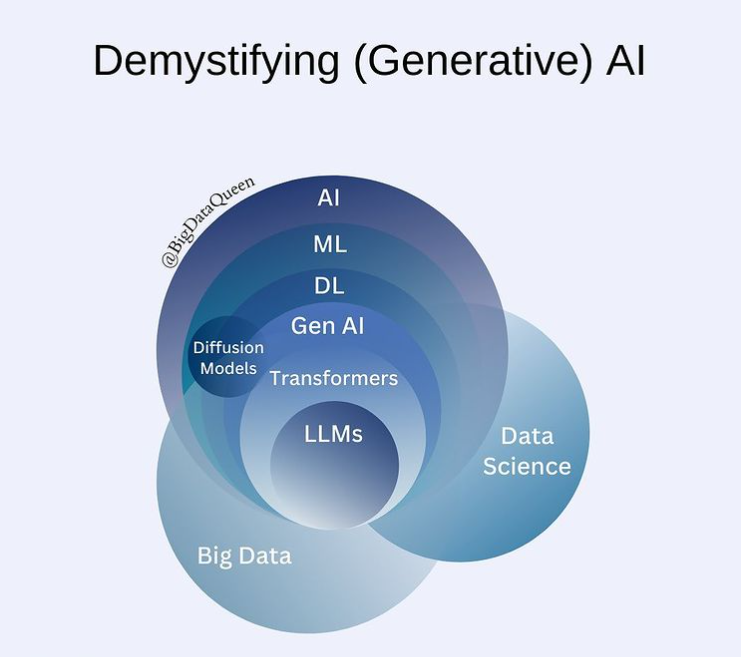Generative AI has been making waves in various fields, and its significance in the legal domain cannot be overlooked. In this comprehensive guide, we will explore the world of AI in law, uncovering its significance, creative potential, and the implications that lie ahead.
Understanding AI in Law

AI’s role in the legal sphere involves harnessing artificial intelligence technologies to enhance, expedite, and elevate different aspects of the legal process. This encompasses assisting attorneys in research and document analysis, automating mundane tasks, and even predicting legal outcomes. At the heart of AI in law lies Natural Language Processing (NLP), a crucial element that enables systems to comprehend and generate human language. NLP streamlines the review of legal documents and analysis of contracts, paving the way for more efficient legal processes.
Moreover, machine learning algorithms, fueled by extensive datasets, empower AI to decipher intricate patterns within legal data. This capability proves invaluable for tasks such as case law research and precedent analysis. Predictive analytics, another vital facet of AI, leverages historical case data to forecast potential case results, enabling lawyers to make informed strategic decisions. Collectively, these technologies are reshaping the legal landscape, bolstering precision, efficiency, and strategic insight, while also transforming traditional legal roles.
Key Applications of AI in the Legal Sector
AI’s impact on the legal sector can be broadly categorized into two domains: the Practice of Law and the Business of Law. Each of these domains offers unique applications of AI technology, revolutionizing how legal professionals operate and how legal services are delivered.
Practice of Law:
- Legal Research: AI-powered search engines rapidly analyze vast databases, identifying relevant case laws, statutes, and regulations, thereby significantly expediting legal research processes.
- Contract Review and Analysis: Natural Language Processing (NLP) has enabled AI powered contracts, efficiently highlighting key clauses, potential risks, and anomalies, ensuring comprehensive contract scrutiny.
- Predictive Analytics: Machine learning algorithms analyze historical case data, allowing attorneys to predict potential legal outcomes and make well-informed strategic decisions, enhancing their ability to represent clients effectively.
- Legal Document Summarization: AI can summarize lengthy legal documents, making them more accessible and digestible for legal professionals, streamlining case preparation and litigation.
- Case Prediction: AI assesses historical case data to provide insights into potential case outcomes, empowering attorneys to offer informed counsel to clients and improve litigation strategies.

Business of Law:
- Administrative Tasks and Chatbots: AI-driven chatbots efficiently manage appointments, answer routine legal queries, and assist in scheduling, freeing up human resources for more value-added tasks.
- E-Discovery: AI aids in Electronic Discovery (E-Discovery) by analyzing and categorizing electronic data, expediting the identification of evidence relevant to legal cases, reducing time and costs.
- Due Diligence: AI expedites due diligence processes in transactions by swiftly assessing documents and data for potential risks and liabilities, enhancing the efficiency of business transactions.
- Compliance Monitoring: AI continuously monitors regulatory changes and updates, ensuring businesses and organizations remain compliant with evolving legal requirements, reducing compliance risks.
- Intellectual Property Management: AI helps manage intellectual property portfolios by monitoring trademarks, patents, and copyrights for potential infringements, safeguarding intellectual property assets.
- Client Intake and Legal Triage: AI assists in initial client interactions, categorizing inquiries and directing them to the appropriate legal experts, streamlining client management.
While both the Practice of Law and the Business of Law benefit significantly from AI applications, it is the Business of Law that is poised to witness more substantial upheaval. The integration of AI in administrative tasks, compliance management, and client interactions is reshaping the way legal services are delivered and consumed. This shift towards greater efficiency, automation, and accessibility is likely to transform the business models of law firms and legal service providers, making the Business of Law an arena of rapid innovation and transformation. The Practice of Law will certainly see enhancements in research and case management, but it’s the Business of Law that will experience a more profound shift in its operational landscape.
 Generative AI in Law: Differentiation, Potential, and Concerns
Generative AI in Law: Differentiation, Potential, and Concerns
Generative AI in the legal field stands apart from other AI applications, bringing unique characteristics and potential impact. Here’s why it’s distinct and why it’s likely to make a substantial difference:
- Differentiation from Other AI:
Generative AI, particularly in the legal realm, differentiates itself by its capacity to create human-like text and content. While other AI systems excel at tasks like data analysis or image recognition, generative AI focuses on generating textual content that resembles human-generated text. This key feature opens up a realmof possibilities, including drafting legal documents, generating case summaries, and even assisting in legal research with human-like explanations.
- Increased Potential Impact:
Generative AI’s potential to impact the legal sector is profound due to several factors:
- Efficiency Enhancement: Generative AI can draft legal documents, such as contracts and legal briefs, at a fraction of the time it would take a human attorney. This efficiency can lead to cost savings and faster legal processes.
- Accessible Legal Information: By generating plain-language explanations and summaries of complex legal matters, generative AI can democratize access to legal information. Individuals without legal backgrounds can better understand their rights and obligations.
- 24/7 Assistance: Generative AI can provide legal assistance round the clock, answering common legal questions and guiding users through various legal processes, reducing the burden on legal professionals.
- Scaling Legal Services: Law firms can scale their services more effectively with generative AI, handling a larger volume of cases and clients without a proportional increase in human resources.
- Customized Legal Documents: Generative AI can generate customized legal documents based on user input, tailoring contracts, wills, and other legal papers to specific needs.
- Legal Research Support: It can assist legal professionals by summarizing case law, highlighting key legal principles, and even suggesting potential legal strategies based on historical case data.
Concerns and Considerations:
While the potential of generative AI in law is exciting, several concerns must be addressed:
- Accuracy and Legal Standards: Ensuring that AI-generated content aligns precisely with legal standards and intentions is crucial to prevent errors with legal consequences.
- Ethical Considerations: The integration of generative AI raises ethical concerns, such as confidentiality and impartiality. Upholding ethical norms in AI-generated content is paramount.
- Data Security: Protecting sensitive legal data is essential when using generative AI. Robust data security measures must be in place to safeguard confidential information.
- Algorithmic Bias: Generative AI can inherit biases present in its training data, potentially perpetuating inequalities in the legal system. Continuous monitoring and mitigation of bias are essential.
- Regulatory Compliance: Adherence to evolving legal regulations regarding AI in the legal sector is crucial. Striking a balance between innovation and legal compliance is a complex challenge.
- Human Oversight: While AI can enhance legal processes, human oversight remains essential. Legal professionals must review and validate AI-generated content to ensure accuracy and ethical standards.
Generative AI in law holds immense promise, but its responsible deployment and vigilant oversight are essential to harness its potential while upholding legal and ethical standards.
The Future of AI in Law and Conclusion
The future of AI in law is dynamic, marked by an ongoing debate between Embrace and Resistance. Within the legal community, discussions persist regarding the extent to which AI should be integrated into traditional practices. While some emphasize AI’s potential to revolutionize efficiency and accessibility, others voice concerns about job displacement and ethical ramifications.
Anticipating the future also involves considering potential Regulations. As AI’s footprint grows, discussions surrounding its ethical use and potential risks will likely result in regulations shaping its deployment within legal contexts. Striking a balance between innovation and safeguarding ethical and legal standards will be pivotal in determining the trajectory of AI’s role in the legal field.
Amidst these dynamic dynamics, the future of AI in law promises a fusion of technology and human expertise, poised to redefine the landscape of legal practice in unforeseen yet promising ways. As the legal community navigates this transformative journey, continuous learning and adaptation will be key to harnessing AI’s potential while offering unique expertise that machines cannot replicate.
